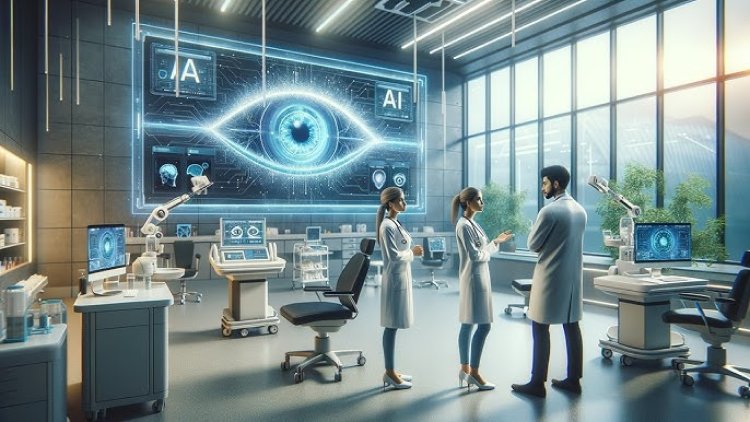AI Development in Healthcare: Can Artificial Intelligence Replace Doctors?
Learn how AI is enhancing doctors' efficiency while preserving the essential human touch in healthcare with advanced diagnostics, data-driven insights, and collaborative tools
Share this Post to earn Money ( Upto ₹100 per 1000 Views )

Introduction
Healthcare AI development is enhancing diagnostic accuracy, enhancing patient outcomes, and optimizing treatment courses. AI is increasingly impacting the healthcare industry, especially regarding the role of healthcare professionals, in today's increasingly technological world.
“Can AI replace doctors?” ”Does AI replace those doctors who don't use it?” has been echoing. This article emphasizes the augmentative roles of artificial intelligence in medicine, underlining that AI is complementing doctors and nurses, rather than replacing them.
The fundamental solution proliferates with the human-AI collaboration, merging the cognitive strengths of healthcare providers with the analytical capabilities of AI.
What is AI in the Healthcare Industry and When is it Used?
The application of AI in custom healthcare app development involves a "rule-based expert system" that uses prescribed knowledge-based rules to address a challenge accompanied by a "robotic process," which leverages automation technologies to mimic a human worker's tasks.
In particular, medical errors, burnout among professionals, inefficient data management, and increasing costs are among the issues ready for AI-based solutions. AI for healthcare can save $150 billion annually in the US alone by 2026, according to an Accenture report.
There is much more to technology than numbers and potential savings. Diagnostic tools powered by AI can detect diseases early, resulting in better outcomes for patients. Medics can now focus on patient care by using AI to automate administrative tasks.
The Role of AI in Healthcare
AI is already a valuable tool in the healthcare industry. In addition to analyzing large datasets and identifying patterns, it offers insights that would take humans significantly longer to discover. AI-powered diagnostic tools, for example, can detect diseases like cancer at an early stage through imaging analysis. Using predictive analytics, physicians can anticipate patient outcomes and take preventive measures.
By automating appointment scheduling, record-keeping, and insurance processing, AI enables healthcare providers to focus on patient care. Additionally, generative AI is revolutionizing drug development by accelerating research and identifying candidates for clinical trials.
Why AI Cannot Replace Doctors
Human doctors are capable of emotional intelligence, critical thinking, and adaptability. AI cannot fully replace doctors for the following reasons:
-
Human Intuition and Empathy
Although AI is powered by data and algorithms, it cannot replicate the human "gut feeling" or empathy required for patient communication. In addition to symptoms, a patient's condition involves their emotions, experiences, and fears, which can only be understood and addressed by a human.
-
Complex Decision-Making
There are often unpredictable scenarios and multifaceted decisions involved in medical care that require ethical considerations. Unlike doctors, artificial intelligence cannot consider cultural, personal, or moral factors when making recommendations.
-
Limitations in Training Data
Artificial intelligence models are trained on existing data. The AI might be unable to provide accurate insights if a condition or scenario is not included in this dataset. In contrast, doctors can adapt and innovate when faced with unprecedented challenges.
-
Regulatory and Ethical Challenges
Healthcare AI implementation requires navigating strict regulatory standards, protecting data privacy, and maintaining accountability for errors. A computer algorithm cannot accept responsibility for the results or recommendations it makes like a human doctor.
AI as a Collaborative Tool
Artificial intelligence enhances the capabilities of doctors rather than replacing them. With AI-assisted surgery, surgeons can make informed decisions based on real-time data and precision. Similarly, telemedicine platforms powered by AI extend healthcare access to remote areas, but doctors still make the final decisions.
Conclusion
The potential benefits and opportunities offered by artificial intelligence promise to revolutionize healthcare. Medical AI has the potential to change the trajectory of human history and transform the healthcare industry. ML NLP, AI, and 3D bioprinting may one day replace damaged organs as easily as machine parts.
Healthcare app development with AI is accelerating rapidly, with India emerging as a hotbed of innovation. Artificial intelligence will enhance physician performance rather than replace human doctors, but it will also make healthcare more accessible and affordable for patients. Proper regulations and a legal framework are vital if you are planning to harness the benefits of AI in healthcare.
Learn how Vigorous IT Solutions can help you navigate and use these advancements in AI.

















